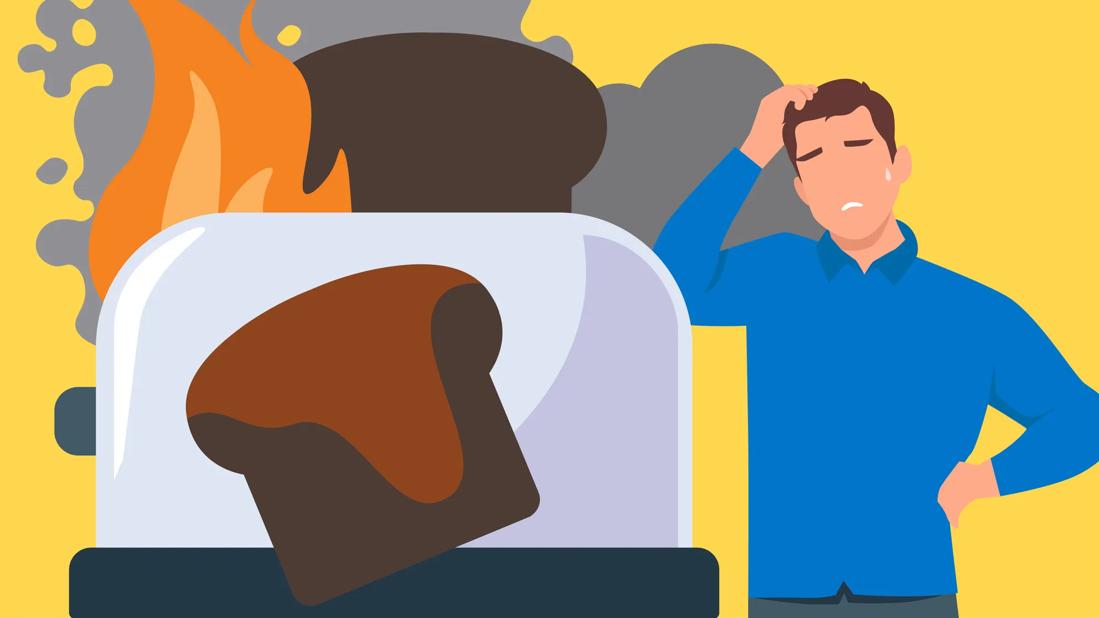It’s all about reframing a negative situation and believing minor setbacks can pave the way for something positive

Small snags or setbacks in your day — like spilling your coffee, having to scrape the ice off your car or waiting in a long line at the gas station — can derail your day.
Advertisement
Cleveland Clinic is a non-profit academic medical center. Advertising on our site helps support our mission. We do not endorse non-Cleveland Clinic products or services. Policy
But the burnt toast theory is a belief that those minor inconveniences can lead to a positive outcome at a later time — for example, maybe you miss rush-hour traffic or maybe you arrive at work just in time to walk into the office with a friend.
Psychologist Brianne Markley, PhD, explains the benefits of reframing negative situations and looking at the bright side.
“It’s a concept based on reframing. Something as simple as burning your toast in the morning, though it might be frustrating and inconvenient, might actually have happened for good reason,” explains Dr. Markley. “Maybe it slows you down a bit, but it may also give you an extra two minutes to breathe while you wait for new toast. Or maybe being an extra five minutes late prevents you from hitting all red lights on your way into work.”
The idea is that these frustrating situations may have a domino effect in your life — setting you up for something positive or keeping you from other problematic situations. A few other ways to think of it? Everything happens for a reason. Or look for the silver lining.
Dr. Markley says that whether or not burning your toast impacts your day by changing the course of events, the setback does provide an opportunity to cope, reframe your frustration, and then refocus your thoughts and energy more productively.
Advertisement
And it doesn’t just have to be burnt toast that leads to you reframing your day — it’s more of a metaphor for how trivial occurrences can lead to a positive moment in your life.
Other examples include:
It’s easy to think that burnt toast is just like other positive thinking methods such as lucky girl syndrome or toxic positivity, which is a belief that you should have a positive outlook on life regardless of the situation.
“I describe toxic positivity as throwing glitter at things that don’t sparkle. Toxic positivity is not actually all that helpful. Some things are allowed to be upsetting and not everything needs to be positively reframed,” stresses Dr. Markley.
“The burnt toast theory isn’t encouraging you to be grateful for blackened toast. You can still be frustrated that your toast is burnt, but it gives you an opportunity to reroute, reframe and overcome a small setback.”
You’re upset about your toast, but again, you can also view it as an opportunity: Burning my toast is a bummer, but I can manage this and move forward.
“Though a lot of things in life are out of your control, it’s important to remember that you do have a choice in how you respond to them,” she reminds us.
Using the burnt toast theory can help you build important and invaluable skills.
Remember: You’re human and minor setbacks and inconveniences are going to happen. That’s not a character flaw.
“You don’t need to be self-critical about those things. You just need to adapt and move through them in a healthy way,” says Dr. Markley. “That’s where more self-compassion comes in.”
You’re frustrated about the burnt toast, which is totally understandable. A good tip? Practice mindfulness.
“Take a moment to catch your breath and walk away from the situation,” suggests Dr. Markley. “Use it as a calming technique so you’re not letting your emotions take over and cloud your mind. It’s a way to find a moment of calmness.”
If you have a problem or a setback, you often need a solution. Your problem-solving skills will likely kick in. Should you make another batch of toast? What else can you eat instead?
“These small inconveniences allow you to build a distress tolerance, or your ability to manage difficult emotional situations,” notes Dr. Markley. “Over time, your psychological resilience will become stronger.”
Using the idea of the burnt toast theory can help you navigate small annoyances or issues throughout the day.
Advertisement
“Minor inconveniences are going to happen and are inevitable,” concludes Dr. Markley. “How you respond to them, how you work through them and how you treat yourself during the process — that’s what matters most.”
Advertisement

Sign up for our Health Essentials emails for expert guidance on nutrition, fitness, sleep, skin care and more.
Learn more about our editorial process.
Advertisement

Burnout is often driven by long periods of stress without time to recover — but practicing self-care and creating work/life boundaries can help

If you’re torn between contradictory beliefs, questioning your decisions or feeling ashamed about your choices, you may be experiencing cognitive dissonance

This theory of human motivation says people seek to meet their needs in a predictable order

This trendy practice may boost your physical and mental health — but done incorrectly, it could make things worse

Only some people experience autonomous sensory meridian responses, but it can be beneficial to those who do

You can address negative thinking by reframing the situation, asking for help when you’re stuck and giving yourself some grace

The power of positive thinking can influence your physical, mental and emotional health

Speaking, thinking or writing these affirming statements can help boost confidence, reduce anxiety and overcome self-doubt

Even small moments of time outdoors can help reduce stress, boost mood and restore a sense of calm

A correct prescription helps your eyes see clearly — but as natural changes occur, you may need stronger or different eyeglasses

Both are medical emergencies, but they are very distinct events with different causes